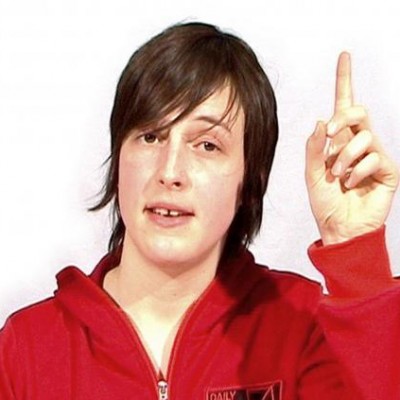Anger over The Glasgow Effect opens up a raft of issues for modern Scotland, writes Neil Cooper
January 8, 2016
Support independent, non-corporate media.
Donate here!

I’d vaguely noticed the picture of a poke of chips floating about an event post on my Facebook feed for a while before it really caught my eye. For a couple of days, ever since it was posted at one minute to midnight on Hogmanay 2015, I’d half-registered the words The Glasgow Effect accompanying the picture. At the time, the words didn’t really mean anything, certainly not in the way they do now, so wasn’t really something to concern myself with. When I eventually clicked onto the post, I was first bemused, then confused by what I read. There are a ton of event invitations that pop up on social media over the course of the day, but this one seemed to be written in some opaque bureaucrat-speak, and didn’t seem to refer to an event at all. Which is fine if that’s what you’re into, and the name Ellie Harrison rang a bell, right enough, but I was too distracted by other things to pay it much attention.
Only when a friend private messaged me with the words ‘so have you seen this?’ above a link to the same event page with the same poke of chips picture did I look at it closely. Okay, I get it now, I thought. It’s an art thing. A concept. I’m down with that, even if it does sound a bit daft. I get invited to that sort of caper all the time.
Someone lives in Glasgow for a year as a durational project and does something or other that I’m not exactly clear about. And Creative Scotland gave the artist 15k for it? That’s certainly their style of language alright, even though they say they’ve ditched it for something simpler. No wonder I can’t quite get to grips with it. To be fair, though, it seems to have been written by this Ellie Harrison person, and sometimes artists writing about their ideas can be just as impenetrable as arts quango lingo. But if Harrison didn’t write it, she must have the worst PR person in the world if that’s what they came up with.
And then I remember that Ellie Harrison was one of the artists who took part in a group show at the Talbot Rice Gallery in Edinburgh in the run-up to the referendum. Her thing was to have a couple of cannons in one of the rooms, which, in the event of a Yes vote, and only in the event of a Yes vote, would fire confetti into the air at what would have undoubtedly been a great big celebration party.
What was it called again? Something about how after the revolution, someone still has to clean up. Of course, the Yes vote never happened, so the cannons weren’t fired. Even so, the title reminded me of that John Cooper-Clarke poem, Apart From The Revolution, It’s Another Working Day.
Then I started thinking about the people who ran the Music is the Music Thing festival in Glasgow, which was a DIY type festival run across several small venues. Over one weekend, the festival put on the best left-field bands in Glasgow. A couple of these even had Turner Prize winners and nominees in them, and David Shrigley did the poster and everything. There had been two previous Music is the Music Thing festivals, which had been run on little or no money, which meant no-one got paid much at all, least of all the people putting it on, I expect.
For the third Music is the Music Thing, the people running it wanted to do it properly so they could try and pay people, and applied to Creative Scotland for 15k. They were knocked back for this, with the only explanation coming in the form of a standard letter saying something vague about how, in a competitive climate there were many quality projects and how this time out Music is the Music Thing had been unsuccessful in their application, that sort of thing. I’d seen several letters like this, which other people who made unsuccessful applications to Creative Scotland received, and which had identical wording to the one Music is the Music Thing had been sent.
Because Music is the Music Thing was turned down for £15k by Creative Scotland, it meant that it didn’t happen again. Fielding, who was one of the people behind it, moved from Glasgow to London to become one of the producers at Cafe Oto, which is a huge loss to Glasgow and Scotland, but Cafe Oto is the best left-field music venue in the UK, and Fielding puts brilliant stuff on there. It’s just a shame it’s not in Glasgow is all.
And I tell some of this to my friend who sent me the link to Ellie Harrison’s The Glasgow Effect page. I tell her that I remember when I was on the dole years ago, that I was so skint that I’m sure there was at least one year when I didn’t leave Edinburgh, and I remember the sheer elation of getting on a bus or a train for the first time after that in a way that I take for granted these days.
Later, I also remember when I was on the dole, that, at some point – and there was quite a few years of this, so I can’t quite remember when – I used to cash my Giros at the big post office on the corner of the Bridges and Princes Street, which was in the building which is now called Waverleygate, and is where Creative Scotland has its offices. That’s how everyone got their equivalent of an arts council grant in those days, signing on once a fortnight for as long as they could in a way that’s pretty much impossible to do now.
And I tell my friend who sent me the link that, while I may look into Ellie Harrison’s The Glasgow Effect further, in the spirit of what the piece may or may not be about, I’ll probably just ignore it and stay home. And it’s all a bit of a laugh, because that’s what you do when you’re sent stuff like this. It’s fun.
Then I notice on social media that other people are starting to pick up on Ellie Harrison’s The Glasgow Effect as well. Maybe they already were and I was just letting that picture of the poke of chips pass me by. Again, it’s all being treated as a bit of light-hearted fun, something to raise an eyebrow at and smirk knowingly about, like you see newsreaders do whenever they have to talk about conceptual art or something else they haven’t a clue about.
It’s like what happened when Assemble won the Turner Prize at Tramway in Glasgow. Assemble was a design company, for goodness sake. They worked in the community. What they did wasn’t proper art. It was a joke, just like Ellie Harrison’s The Glasgow Effect. Wasn’t it?
In terms of The Glasgow Effect, some serious commentators seem to think so, as do some artists, who, somewhat surprisingly, seem to be cheer-leading the smatterings of less amused, more kneejerk stuff that’s being posted in response to it. But it’s still a laugh.
All of which starts me thinking about those endless pub conversations I’ve recently been having with mates who keep telling me that arts funding is a luxury, and that there are people starving, and how art is for an elite.
I think about how I keep telling them in response that art isn’t a luxury, and how most artists earn ten grand or less a year, and that if they don’t like the arts being subsidised, then fine, throw away your telly and stop watching films and TV dramas. Because every actor in those films and TV dramas, and every designer and technician and prop maker who worked on them, chances are that at some point they worked in a publicly subsidised theatre, or received some kind of publicly funded bursary to train and learn their craft and find out what they’re about.
And if they think the arts in general are a luxury, or for an elite, then fine, they should throw out their clothes and their furniture and pretty much everything they own. Because, even if they’re mass produced, pretty much every single thing will have originated, and been designed and thought out by and in some cases made by artists. But because we wear a shirt a certain way while sitting on a particular type of stool while leaning on a particular-shaped bar, we take all that for granted.
I tried to explain to them how much art brings back to the economy, and how even the Tories get that. It’s an argument I hate having to make, because art shouldn’t have to be judged in economic terms, but it’s the only argument that people with money or who don’t really care much about art understand. And it’s one that everyone’s had to make for at least the last thirty years or so, just to get those people off their backs.
And I think about my mates who think arts funding is a luxury belonging to an elite, and I think, how the fuck am I going to justify Ellie Harrison’s The Glasgow Effect to them? Because, in truth, I don’t really know what I think about Ellie Harrison’s The Glasgow Effect myself. And that’s when everything starts to stop being funny. Because within an hour of me thinking all this, all that slightly snidey, smirky and ever so slightly superior piss-takey stuff online has been taken over by something far uglier.
On the comments beneath Ellie Harrison’s blurb for her Glasgow Effect Facebook event page just beneath the poke of chips are an ever increasing stream of comments, and most of them are angry. Some of them are really angry.
Next thing, one of the tabloids has published a story on it online, which means that the comments on Ellie Harrison’s Glasgow Effect Facebook event page are being posted thicker, faster, and by and large more angrier than ever. The fact that the tabloid for no good reason whatsoever published the fact that Ellie Harrison is English doesn’t help, even though as it turns out she studied in Glasgow, and has lived there for nearly eight years, and works as a part time lecturer at Duncan of Jordanstone College in Dundee.
But no-one bothers about all that. They just seem to keep on with the anger. And among all the chatter and the clatter, there seems to be a million things being hurled at Ellie Harrison from all sorts of angles. There are some people who think that arts funding is a bad thing altogether, which is stupid, for all the reasons I defended arts funding to my mates. Others think it’s a daft idea that’s been presented really badly, at least one of which may be true.
A fair few of the posts take umbrage with the name of the project, and the fact that it’s illustrated with a poke of chips. The Glasgow Effect, as I discover through reading the posts, is a phrase coined to describe the poor health and low life expectancy of people who live in socially and economically deprived areas of Glasgow compared to other parts of the UK. Illustrating it with a poke of chips, some posters suggest, just adds insult to injury.
If she’d wanted to make life easy for herself, Harrison could have called her project The Glasgow Miracle. This is a phrase dumped on the city’s thriving arts scenes like so much yesterday’s arse-porridge, but which is probably an even stupider phrase than The Glasgow Effect. Rather than looking at the unique set of social, political and economic circumstances that have sired and nurtured the success of artists in or from the city over several decades, the self-deifying pseudo-glory of the phrase, The Glasgow Miracle, prefers to cite unspecified quasi-mysticism instead.
While I’m thinking about all this, some of the posts on The Glasgow Effect Facebook event page have turned increasingly abusive. Someone calls Ellie Harrison a cunt. Another tells her she should fuck off back to England. One says they hope she dies of AIDS.
But beyond the abuse, and the xenophobia, and the misogyny, and the presumptions about what class Ellie Harrison comes from by people who didn’t know anything about her until they just read about her on a tabloid website, some of the criticisms are valid. These criticisms are about presentation, patronisation and provocation, and about the mixed messages that Harrison and The Glasgow Effect are sending out.
Quite a few people suggest that maybe all that anger being vented at Harrison is all her own fault for putting such a bemusing, confusing blurb on The Glasgow Effect page, written as it is in Creative Scotland style bureaucratese beneath a picture of a poke of chips. And maybe it was deliberate. Maybe it was all one big, elaborate, attention-seeking wheeze?
As time goes by – and the blogposts and comments are blasting in on social media like wildfire now – a new tone emerges, and an underlying but unmistakable patina of jealousy bubbles to the surface. It’s certainly not as bad as advertised elsewhere, but some of Harrison’s fellow artists, who maybe have or haven’t been supported with public money, suddenly seem as angry as the xenophobes and the misogynists. And some people, who normally like to present their social media personas as left-wing, anarchic or avant-garde, have suddenly started frothing like Daily Mail leader writers.
And I start thinking, as I often do, about Joy Division and Factory Records, and about how Tony Wilson was lambasted from some quarters for flirting with fascism by allowing his label’s otherwise critically acclaimed band, who would go on to change music forever, name themselves after the real life brothels in Nazi death camps which had been fictionalised in a novella called House of Dolls. I think how Wilson’s arty-farty, Cambridge educated motormouth would defend all this by talking about signs and signifiers, and complexities and contradictions. Or at least Steve Coogan did when he played Wilson in Michael Winterbottom’s film, Twenty-Four Hour Party People.
I think as well, as I probably do even more than I do about Joy Division and Factory Records, about Bill Drummond and Jimmy Cauty, and The K Foundation burning a million quid on Jura in 1995. That million quid wasn’t public money, but was money that Drummond and Cauty made as chart-topping ‘stadium house’ group, The KLF, but it still pissed people off when they did it.
And I remember watching a BBC documentary that told the story of the K Foundation burning a million quid, and which at one point filmed Drummond and Cauty touring the film of them actually burning it around arts centres in the UK. That tour included the CCA in Glasgow, which, in terms of the reaction to The Glasgow Effect, seems somehow relevant.
In the BBC documentary, Drummond and Cauty were filmed doing a Q&A after the screening of the film of them burning a million quid at Tony Wilson’s In The City music conference in Manchester. In the couple of minutes shown, some people in the audience, who included Wilson, seemed amused by the whole thing. In the Q&A, one member of the audience said what The K Foundation had done was a waste of money. Someone else called it an an indulgence. One person seemed to suggest that Drummond and Cauty could have set fire to themselves, though actually, while it was turned into a joke, he seemed more concerned with health and safety issues.
I showed the first half of the BBC documentary about The K Foundation to fourth year arts journalism students last year. The idea was to try and get them thinking about value, and how art, or whatever The K Foundation burning a million quid was, is judged. I remember the shock on their faces afterwards, and how vocal they were, about why anyone would want to burn a million quid when they could be doing so much else with it.
This was interesting, because, up to that point, trying to get this class of fourth year arts journalism students to talk about anything, let alone with such passion, hadn’t been easy. And even though they’d never heard about The K Foundation burning a million quid, an event that had happened before many of them were born, until an hour before, some of them were really angry, and they all had about a million different things to say about it.
And I’m reminded of Forest Pitch, when in 2012 artist Craig Coulthard created a football pitch near Selkirk for a group of teams made up of people who had moved to Scotland from all over the world to play on it. Following the two games that were played on the site, 800 hundred trees were planted. This is simplifying things somewhat, as there was a great deal of thought behind Forest Pitch that took a year to bring it to fruition, but the information is all out there if anyone can be bothered looking.
In the run up to Forest Pitch, which was supposed to happen at the same time as the London Olympics, there was a lot of harrumphing from some local councillors in the area about whether Forest Pitch was art or not, and whether public money – in this case a six figure sum – should be being spent on a football match when in their eyes there were probably more worthwhile things to spend it on.
To his credit, the then CEO of Creative Scotland made a robust public defence of Forest Pitch and its artistic worth, and, after a false start because of torrential rain causing the pitch to flood, the games went ahead. By all accounts it was great fun. The trees are apparently coming on quite nicely as well.
In the wake of the furore over Ellie Harrison’s The Glasgow Effect over the last few days, Creative Scotland issued a bright but bland statement of support for the project, which was attributed to an un-named spokesperson.
All of which makes me want to defend Ellie Harrison’s The Glasgow Effect, even though I still don’t know what I think about it, because I don’t know what it is. What I do know is that no-one else does either. But I don’t really mind that, because, as some of the more rational commentators have pointed out, the project, if that’s what it is, hasn’t really started yet, and there’s another 350-odd days for Harrison to do whatever she may or may not be doing with it.
I do know as well that, after looking into Harrison’s work beyond The Glasgow Effect and the cannons in After The Revolution, Who Will Clean Up All The Mess? at the Talbot Rice, while all this has been going on, I reckon I’d probably like some of it. Some stuff I probably wouldn’t get, or maybe lots of it, but I reckon it would still be interesting.
On General Election night 2010, Harrison did an all-night live performance called General Election Drinking Game, and a year later did an installation called A Brief History of Privatisation, which used a circle of electric massage chairs to re-enact the history of UK public service policy over the last century. She also used popcorn making machines to re-enact the roots of capitalism in something called The History of Financial Crises. All of which sound a lot of fun, and which seem to tap into the current artistic tropes of social-based art and performance-based work. Best of all, and I don’t know how she defined it but I don’t really care either, Harrison campaigned for the renationalisation of British Rail.
Little if any of of Harrison’s work can be economised or monetised in the way most contemporary art can. This is maybe what gets people’s backs up about it, the same way some people got shirty when Assemble won the Turner. It can’t be flogged off in an overpriced art market. Not until the property developing classes figure out a way to make some money out of it, anyroad, and rest assured they will.
While I’m thinking about all this, Harrison puts up a statement on the Glasgow Effect event page in response to everything that’s being hurled at her. She sounds cheerfully unrepentant, and is being a lot more straightforward than the blurb.
In her statement, Harrison, says that the 15k of Creative Scotland money will be ‘donated’ to Duncan of Jordanstone to fund someone to be employed to take over her post, while she takes paid ‘Research Leave’. This may or may not be allowed under existing Creative Scotland guidelines, though making such a statement in the way she does is unlikely to make her too popular in either institution.
Later, Harrison puts online her full application to Creative Scotland which saw her awarded the 15k. In terms of everything that has gone before, it’s a bit of an eye-opener. From start to finish, the application for The Glasgow Effect, which, as it turns out, was originally titled the far more appealing Think Global, Act Local, is an eye-popping masterclass in opaque box-ticking phrases that only the anonymous committees inside the former post office that is Waverleygate can truly decipher.
If you read the application several times, then several times again, what emerges is a simple holistic, if at times naïve-sounding proposal of a sort that is pretty commonplace these days, and which elsewhere largely gets by unmolested. Wrapped up in such seemingly wilfully mystifying language, however, it’s no surprise it’s alienated so many.
And if the language of The Glasgow Effect as it stands has been the cause of that alienation, that’s not Ellie Harrison’s fault. It’s that of the ideology-led institutions she’s caught between, and which she may have just subverted, even as she’s currently having to suffer the slings and arrows of what many consider to be outrageous fortune.
What happens next with The Glasgow Effect is anybody’s guess, and I won’t know what I really think about it until this time next year, when whatever happens has happened. But beyond the often unpleasant if weirdly addictive strain of click-bait it’s thrown up, it’s already exposed how easy it is in the heat of a moment you don’t like to fall for a culture of divide and rule that leaves everybody powerless. The job now, for Harrison, and for everybody else, is to seize the power back. I hope The Glasgow Effect does something wonderful to help make that happen.










